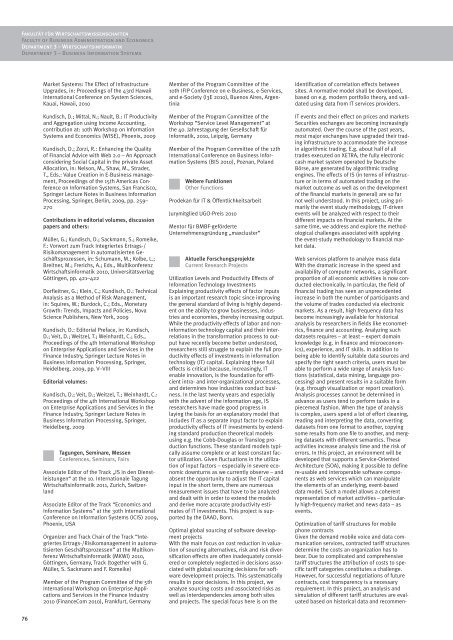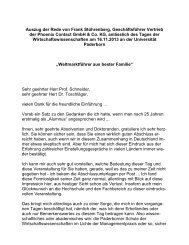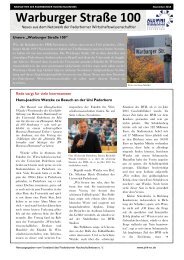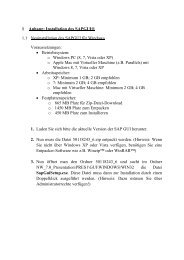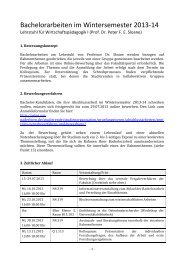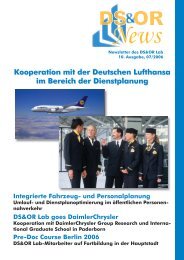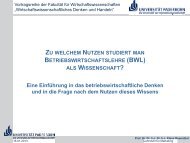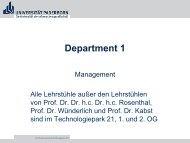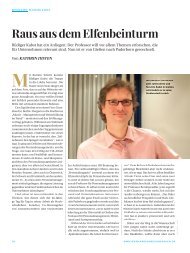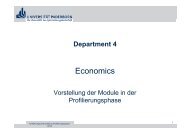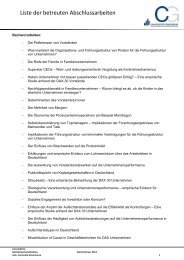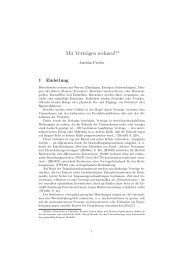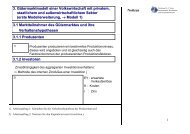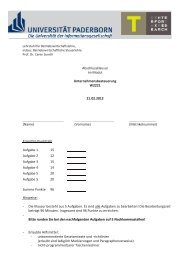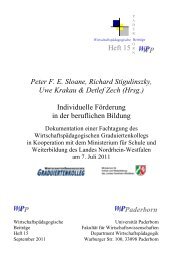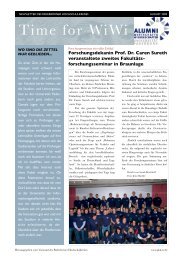Jahresbericht 2009/2010 - Fakultät für Wirtschaftswissenschaften ...
Jahresbericht 2009/2010 - Fakultät für Wirtschaftswissenschaften ...
Jahresbericht 2009/2010 - Fakultät für Wirtschaftswissenschaften ...
Erfolgreiche ePaper selbst erstellen
Machen Sie aus Ihren PDF Publikationen ein blätterbares Flipbook mit unserer einzigartigen Google optimierten e-Paper Software.
<strong>Fakultät</strong> <strong>für</strong> <strong>Wirtschaftswissenschaften</strong><br />
Faculty of Business Administration and Economics<br />
Department 3 – Wirtschaftsinformatik<br />
Department 3 – Business Information Systems<br />
76<br />
Market Systems: The Effect of Infrastructure<br />
Upgrades, in: Proceedings of the 43rd Hawaii<br />
International Conference on System Sciences,<br />
Kauai, Hawaii, <strong>2010</strong><br />
Kundisch, D.; Mittal, N.; Nault, B.: IT Productivity<br />
and Aggregation using Income Accounting,<br />
contribution at: 10th Workshop on Information<br />
Systems and Economics (WISE), Phoenix, <strong>2009</strong><br />
Kundisch, D.; Zorzi, R.: Enhancing the Quality<br />
of Financial Advice with Web 2.0 – An Approach<br />
considering Social Capital in the private Asset<br />
Allocation, in: Nelson, M., Shaw, M., Strader,<br />
T., Eds.: Value Creation in E-Business management,<br />
Proceedings of the 15th Americas Con -<br />
ference on Information Systems, San Francisco,<br />
Springer Lecture Notes in Business Information<br />
Process ing, Springer, Berlin, <strong>2009</strong>, pp. 259–<br />
270<br />
Contributions in editorial volumes, discussion<br />
papers and others:<br />
Müller, G.; Kundisch, D.; Sackmann, S.; Romeike,<br />
F.: Vorwort zum Track Integriertes Ertrags-/<br />
Risiko management in automatisierten Ge -<br />
schäftsprozessen, in: Schumann, M.; Kolbe, L.;<br />
Breitner, M.; Frerichs, A.; Eds., Multikonferenz<br />
Wirtschaftsinformatik <strong>2010</strong>, Universitätsverlag<br />
Göttingen, pp. 421–422<br />
Dorfleitner, G.; Klein, C.; Kundisch, D.: Technical<br />
Analysis as a Method of Risk Management,<br />
in: Squires, W.; Burdock, C.; Eds., Monetary<br />
Growth: Trends, Impacts and Policies, Nova<br />
Science Publishers, New York, <strong>2009</strong><br />
Kundisch, D.: Editorial Preface, in: Kundisch,<br />
D.; Veit, D.; Weitzel, T.; Weinhardt, C.; Eds.,<br />
Proceedings of the 4th International Workshop<br />
on Enterprise Applications and Services in the<br />
Finance Industry, Springer Lecture Notes in<br />
Business Information Processing, Springer,<br />
Heidelberg, <strong>2009</strong>, pp. V–VIII<br />
Editorial volumes:<br />
Kundisch, D.; Veit, D.; Weitzel, T.; Weinhardt, C.:<br />
Proceedings of the 4th International Workshop<br />
on Enterprise Applications and Services in the<br />
Finance Industry, Springer Lecture Notes in<br />
Business Information Processing, Springer,<br />
Heidelberg, <strong>2009</strong><br />
Tagungen, Seminare, Messen<br />
Conferences, Seminars, Fairs<br />
Associate Editor of the Track „IS in den Dienst -<br />
leistungen“ at the 10. Internationale Tagung<br />
Wirtschaftsinformatik 2011, Zurich, Switzerland<br />
Associate Editor of the Track “Economics and<br />
Information Systems” at the 30th International<br />
Conference on Information Systems (ICIS) <strong>2009</strong>,<br />
Phoenix, USA<br />
Organizer and Track Chair of the Track “Inte -<br />
grier tes Ertrags-/Risikomanagement in automatisierten<br />
Geschäftsprozessen” at the Multikon -<br />
ferenz Wirtschaftsinformatik (MKWI) <strong>2010</strong>,<br />
Göttingen, Germany, Track (together with G.<br />
Müller, S. Sackmann and F. Romeike)<br />
Member of the Program Committee of the 5th<br />
International Workshop on Enterprise Appli -<br />
cations and Services in the Finance Industry<br />
<strong>2010</strong> (FinanceCom <strong>2010</strong>), Frankfurt, Germany<br />
Member of the Program Committee of the<br />
10th IFIP Conference on e-Business, e-Services,<br />
and e-Society (I3E <strong>2010</strong>), Buenos Aires, Argen -<br />
tinia<br />
Member of the Program Committee of the<br />
Workshop “Service Level Management” at<br />
the 40. Jahrestagung der Gesellschaft <strong>für</strong><br />
Infor matik, <strong>2010</strong>, Leipzig, Germany<br />
Member of the Program Committee of the 12th<br />
International Conference on Business Infor -<br />
mation Systems (BIS <strong>2010</strong>), Poznan, Poland<br />
Weitere Funktionen<br />
Other Functions<br />
Prodekan <strong>für</strong> IT & Öffentlichkeitsarbeit<br />
Jurymitglied UGO-Preis <strong>2010</strong><br />
Mentor <strong>für</strong> BMBF-geförderte<br />
Unternehmensgründung „maxcluster“<br />
Aktuelle Forschungsprojekte<br />
Current Research Projects<br />
Utilization Levels and Productivity Effects of<br />
Information Technology Investments<br />
Explaining productivity effects of factor inputs<br />
is an important research topic since improving<br />
the general standard of living is highly dependent<br />
on the ability to grow businesses, industries<br />
and economies, thereby increasing output.<br />
While the productivity effects of labor and noninformation<br />
technology capital and their interrelations<br />
in the transformation process to output<br />
have recently become better understood,<br />
researchers still struggle to explain the full productivity<br />
effects of investments in information<br />
technology (IT) capital. Explaining these full<br />
effects is critical because, increasingly, IT<br />
enable innovation, is the foundation for efficient<br />
intra- and inter-organizational processes,<br />
and determines how industries conduct business.<br />
In the last twenty years and especially<br />
with the advent of the information age, IS<br />
researchers have made good progress in<br />
laying the basis for an explanatory model that<br />
includes IT as a separate input factor to explain<br />
productivity effects of IT investments by extending<br />
standard production theoretical models<br />
using e.g. the Cobb-Douglas or Translog production<br />
functions. These standard models typically<br />
assume complete or at least constant factor<br />
utilization. Given fluctuations in the utilization<br />
of input factors – especially in severe economic<br />
downturns as we currently observe – and<br />
absent the opportunity to adjust the IT capital<br />
input in the short term, there are numerous<br />
measurement issues that have to be analyzed<br />
and dealt with in order to extend the models<br />
and derive more accurate productivity estimates<br />
of IT investments. This project is supported<br />
by the DAAD, Bonn.<br />
Optimal global sourcing of software development<br />
projects<br />
With the main focus on cost reduction in valuation<br />
of sourcing alternatives, risk and risk diversification<br />
effects are often inadequately considered<br />
or completely neglected in decisions associated<br />
with global sourcing decisions for software<br />
development projects. This systematically<br />
results in poor decisions. In this project, we<br />
analyze sourcing costs and associated risks as<br />
well as interdependencies among both sites<br />
and projects. The special focus here is on the<br />
identification of correlation effects between<br />
sites. A normative model shall be developed,<br />
based on e.g. modern portfolio theory, and validated<br />
using data from IT services providers.<br />
IT events and their effect on prices and markets<br />
Securities exchanges are becoming increasingly<br />
automated. Over the course of the past years,<br />
most major exchanges have upgraded their trading<br />
infrastructure to accommodate the increase<br />
in algorithmic trading. E.g. about half of all<br />
trades executed on XETRA, the fully electronic<br />
cash market system operated by Deutsche<br />
Börse, are generated by algorithmic trading<br />
engines. The effects of IS (in terms of infrastructure<br />
or in terms of automated trading on the<br />
market outcome as well as on the development<br />
of the financial markets in general) are so far<br />
not well understood. In this project, using primarily<br />
the event study methodology, IT-driven<br />
events will be analyzed with respect to their<br />
different impacts on financial markets. At the<br />
same time, we address and explore the method -<br />
ological challenges associated with applying<br />
the event-study methodology to financial market<br />
data.<br />
Web services platform to analyze mass data<br />
With the dramatic increase in the speed and<br />
availability of computer networks, a significant<br />
proportion of all economic activities is now conducted<br />
electronically. In particular, the field of<br />
financial trading has seen an unprecedented<br />
increase in both the number of participants and<br />
the volume of trades conducted via electronic<br />
markets. As a result, high frequency data has<br />
become increasingly available for historical<br />
analysis by researchers in fields like econometrics,<br />
finance and accounting. Analyzing such<br />
datasets requires – at least – expert domain<br />
knowledge (e.g. in finance and microeconomics),<br />
experience, and IT skills. In addition to<br />
being able to identify suitable data sources and<br />
specify the right search criteria, users must be<br />
able to perform a wide range of analysis functions<br />
(statistical, data mining, language processing)<br />
and present results in a suitable form<br />
(e.g. through visualization or report creation).<br />
Analysis processes cannot be determined in<br />
advance as users tend to perform tasks in a<br />
piecemeal fashion. When the type of analysis<br />
is complex, users spend a lot of effort cleaning,<br />
reading and interpreting the data, converting<br />
datasets from one format to another, copying<br />
some results from one file to another, and merging<br />
datasets with different semantics. These<br />
activities increase analysis time and the risk of<br />
errors. In this project, an environment will be<br />
developed that supports a Service-Oriented<br />
Architecture (SOA), making it possible to define<br />
re-usable and interoperable software components<br />
as web services which can manipulate<br />
the elements of an underlying, event-based<br />
data model. Such a model allows a coherent<br />
representation of market activities – particularly<br />
high-frequency market and news data – as<br />
events.<br />
Optimization of tariff structures for mobile<br />
phone contracts<br />
Given the demand mobile voice and data communication<br />
services, contracted tariff structures<br />
determine the costs an organization has to<br />
bear. Due to complicated and comprehensive<br />
tariff structures the attribution of costs to specific<br />
tariff categories constitutes a challenge.<br />
However, for successful negotiations of future<br />
contracts, cost transparency is a necessary<br />
requirement. In this project, an analysis and<br />
simulation of different tariff structures are evaluated<br />
based on historical data and recommen-


